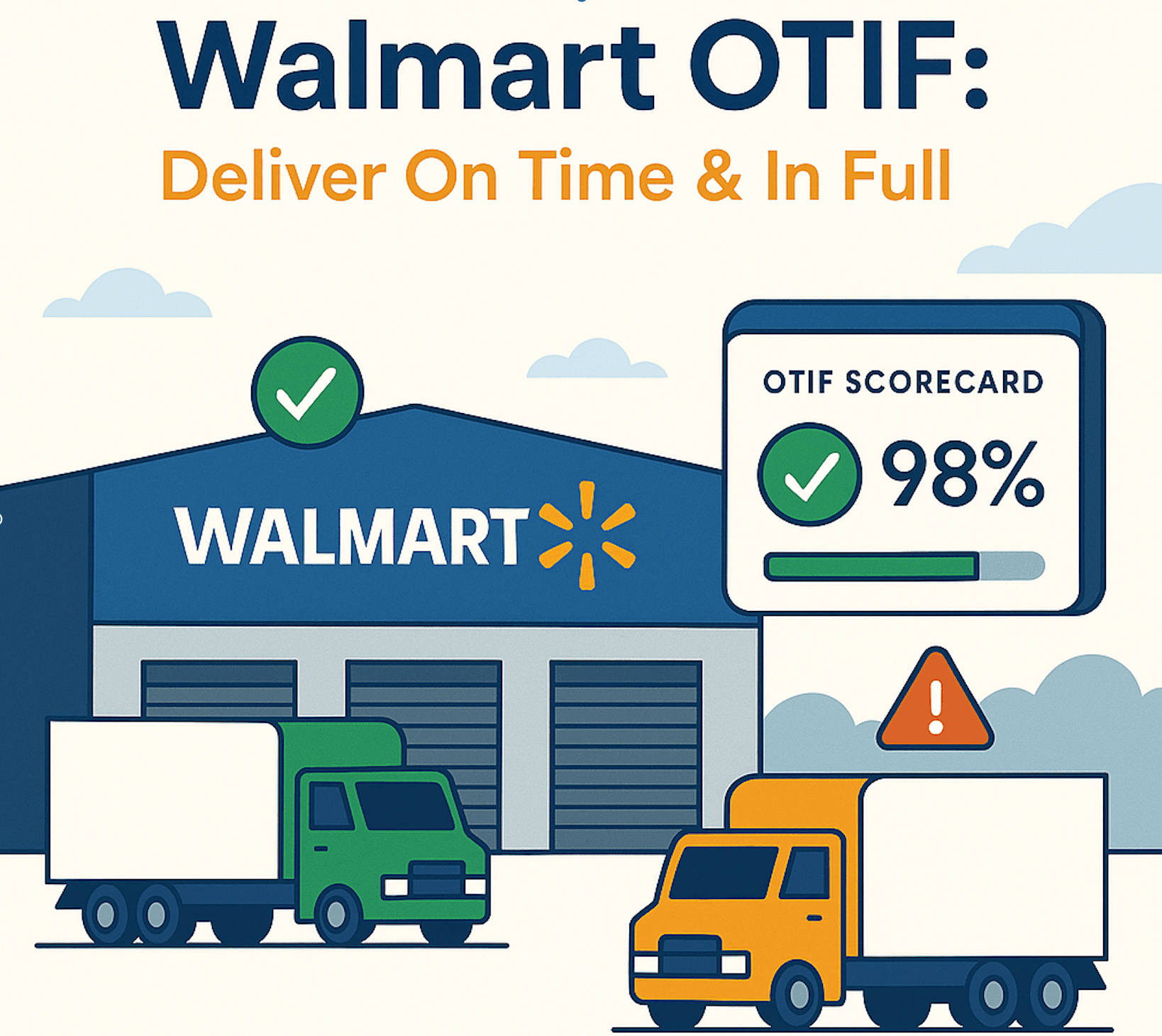OTIF compliance is critical for Walmart suppliers. Discover how Orderful helps reduce errors, prevent costly fines, and keep products on Walmart shelves.
When a company is seeking retailers to distribute its products, Walmart invariably makes it to the top of that list. However, Walmart's On-Time, In-Full (OTIF) program sets strict standards for supplier performance, and suppliers might not know all the nuances of meeting OTIF compliance. Every purchase order has to arrive at the right Walmart distribution center, within the designated delivery window, and in the exact order quantity requested. When suppliers fall short, Walmart issues OTIF fines that can quickly add up.
The main goal of meeting OTIF requirements is to keep your products on Walmart store shelves and protect consumer loyalty. This article explores how Walmart OTIF works, compliance challenges, and how Orderful’s API-first web EDI platform can help you improve accuracy, reduce chargebacks, and meet delivery and quantity expectations every time.
What Is Walmart OTIF?
Walmart’s On-Time, In-Full (OTIF) program measures how reliably suppliers deliver purchase orders to its distribution centers. Fundamentally, OTIF compliance focuses on two key metrics: shipments arriving on time and shipments coming in full. Walmart expects suppliers to consistently meet both standards so that it can keep store shelves stocked and maintain customer satisfaction in its stores.
Walmart tracks results through OTIF scores, which it publishes in a supplier’s OTIF scorecard. The thresholds are high, commonly set at 98% or more, but this can vary by product category. If a shipment misses its must-arrive-by date (MABD), shows up incomplete, or fails to match the purchase order, the supplier risks OTIF penalties. These fines are more than just the cost of doing business. They also signal to Walmart that the supplier may not be dependable, which can affect long-term relationships and future business opportunities.
Walmart OTIF Requirements and Penalties
Walmart sets precise OTIF standards to keep its supply chain running smoothly. Suppliers are measured through their OTIF scorecard, which is published in Retail Link and updated regularly.
Performance doesn't reflect just delivery times, but also whether they include the correct products, quantities, and documentation. Even details, such as carton markings and UCC-128 shipping labels, must be accurate, as errors can lead to rejected shipments and additional costs.
To stay compliant, suppliers need to understand how Walmart measures OTIF performance and what happens when they don't meet requirements.
Walmart OTIF Basics
Requirement | Standard | Penalty for Non-Compliance |
On-time delivery | 98%+ | Chargebacks for each late shipment |
In-full orders | 98%+ | Fines for shortages or missing items |
Accuracy | ASN + labeling compliance | Rejected shipments and added costs |
Why Suppliers Struggle with Walmart OTIF
Meeting Walmart’s OTIF requirements sounds straightforward, but many suppliers discover that the details are often more difficult to get through than they first appear. Common challenges of maintaining Walmart OTIF compliance include:
Inaccurate documents: Errors in purchase orders, advance ship notices (ASNs), or invoices can cause shipments to be delayed, rejected, or marked incomplete.
Limited visibility: Without a real-time view into delivery windows, transportation updates, or order quantity changes, suppliers risk missing their MABD (Maximum Available Business Days).
Manual processes: Data entry and mapping mistakes often lead to non-compliant cases, which can be costly to fix after Walmart has already applied fines or rejected shipments entirely.
Coordination gaps: Miscommunication with carriers or third-party logistics providers (3PLs) can cause late arrivals and incomplete deliveries.
These issues often translate into OTIF penalties, out-of-stocks on store shelves, and reduced trust in the Walmart supplier's ability to meet standards.
How Orderful Helps Suppliers Prevent OTIF Penalties
Orderful’s API-first EDI platform is built to eliminate the common errors that put suppliers at risk of Walmart fines. Instead of waiting until a shipment reaches a distribution center to discover problems, suppliers can validate ASNs, purchase orders (POs), and invoices in real time. This ensures the distribution center receives accurate data on order quantities, carton markings, and must-arrive-by dates before shipments ever leave the warehouse. Automated checks reduce manual errors, while prebuilt mappings for Walmart make compliance faster and less complex.
Beyond document accuracy, Orderful gives suppliers the visibility needed to maintain OTIF compliance. Real-time dashboards highlight potential errors, while instant alerts flag issues that could trigger penalties. Teams can resolve problems quickly, keeping shipments on schedule and complete. Faster onboarding for new product lines also means suppliers can adapt to Walmart’s requirements without lengthy delays. With these tools, companies strengthen supply chain performance and build confidence with one of their most important retail partners.
You Can Use Orderful Beyond Just Walmart
Orderful also lets you connect with other major retailers like Amazon and Target, as well as several e-commerce sellers. With thousands of pre-built connections, the platform makes onboarding new trading partners simple and fast. Many partner connections, including configuration, testing, and validation, often take less than nine days, as opposed to months with traditional on-premises EDI providers.
Step-by-Step: How to Use Orderful to Improve OTIF Scores
Suppliers don’t have to overhaul their operations to meet Walmart’s OTIF standards and avoid fines. Orderful gives you a straightforward process:
Connect to Walmart through one API: Orderful’s single connection replaces multiple custom integrations, making it faster to sync with Walmart’s systems.
Validate purchase orders and ASNs automatically: Catch errors before shipments even leave the warehouse, so Walmart always receives accurate information.
Monitor shipments and invoices in real time: Dashboards give you visibility into delivery windows, quantities, and compliance requirements as orders move through your supply chain.
Resolve issues right away: Instant alerts highlight problems that could trigger OTIF penalties, giving you time to address issues before Walmart flags the shipment.
Following these steps can help your organization consistently hit Walmart’s OTIF goals, avoid unnecessary financial penalties, and ensure that your shipments arrive in the correct quantities at the right time.
Enhance Your Walmart OTIF Performance With Orderful
If you're shipping orders to Walmart, OTIF compliance isn’t optional. It’s a core requirement for any supplier who wants to keep their products on shelves and maintain a long-term relationship with the retail giant. Yet for many organizations, hitting OTIF targets consistently is tough without the right visibility and automation.
Orderful’s modern EDI platform helps you reduce errors, improve supply chain performance, and prevent costly OTIF fines. With real-time data validation, automated alerts, and fast partner onboarding, you can meet Walmart’s standards while also preparing for future growth with other retailers.
Don’t let OTIF penalties cut into your margins. Contact an EDI expert today to discuss your compliance challenges, or book a demo to see how Orderful helps suppliers deliver on time and in full every time.
FAQs About Walmart OTIF
What is Walmart OTIF?
Walmart’s On-Time, In-Full program measures how reliably suppliers deliver orders to its distribution centers. Suppliers must meet strict requirements related to timely delivery and quantity fulfillment in order to avoid OTIF penalties.
What is the penalty for Walmart OTIF non-compliance?
Suppliers who miss delivery windows or ship incomplete orders can face OTIF fines. These penalties are calculated per shipment and can add up quickly if issues continue. Repeated compliance failures can even lead to Walmart discontinuing the supplier relationship.
How is OTIF performance measured?
Performance is tracked through OTIF scores, which appear in the supplier’s OTIF scorecard on Retail Link. Walmart calculates results based on whether shipments arrive by the must-arrive-by date and whether delivered quantities match the purchase order.
Why do suppliers struggle with OTIF?
Suppliers often struggle with OTIF because the program’s requirements are strict and leave little room for error. Inaccurate documents, late ASNs, manual processes, and misaligned carrier coordination make it hard to consistently hit Walmart’s delivery windows.
How does Orderful help suppliers avoid Walmart OTIF fines?
Orderful validates documents in real time, highlights errors before they cause delays, and gives suppliers visibility into shipments, invoices, and partner requirements. This proactive approach helps suppliers prevent fines, reduce rejected shipments, and strengthen Walmart partnerships.

